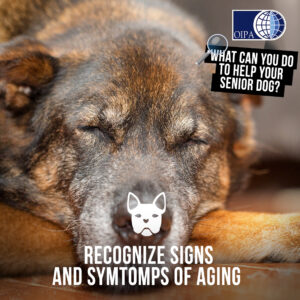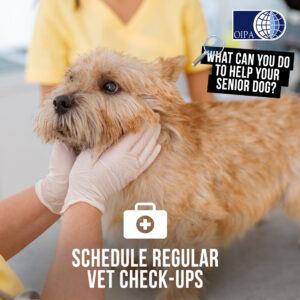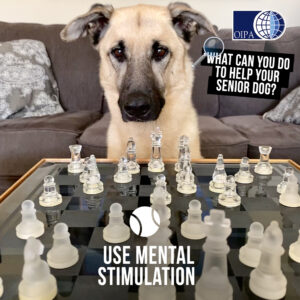Often, caregivers are concerned about a change in their dog’s behaviour that they cannot understand or explain. The dog becomes more nervous and fearful, very sensitive to sounds, and afraid to be left alone. He can bark more and damage things in the house out of fear.
Just realizing that our beloved dog is getting old is not that easy. Maybe this brief article and will make it easier for you.
Dogs don’t live long enough. This is a fact and every dog lover knows it. We are just beginning to get to know our pets well, their needs, and ‘freaks’, and suddenly there is a change in personality.
Different breeds live longer or shorter. Small dogs can live an average of 15-16 years, medium breeds live about 12-14 years, and very large dogs live an average of 7-8 years. By the time they reach full maturity the aging process begins immediately.
HOW DOES AGING LOOK LIKE?
SOME SIGNS AND SYMPTOMS
 This process will look different for each dog, but we can see that the dog sleeps a lot more. A short walk twice a day seems to be a lot of exercise for a dog. Many dogs may lose their appetite because they no longer have the same energy needs.
This process will look different for each dog, but we can see that the dog sleeps a lot more. A short walk twice a day seems to be a lot of exercise for a dog. Many dogs may lose their appetite because they no longer have the same energy needs.
As the aging process deepens, some dogs may seem lost. They can walk around the house at night from room to room. The dogs can sometimes become very sensitive to sounds and even tremble when hearing sounds they used to tolerate.
Some dogs may lose their hearing or sight. This, of course, adds stress to the dog. Dogs don’t lose their sense of smell.
Sometimes dogs can get ‘lost’ in their space. They may walk up to a wall or chair and stare at that ‘thing’ as if they don’t know what to do with it. They forget that they can just turn around and go back the same way.
Nervousness is one of the most common symptoms. It is also more difficult for them to bear loneliness. They may try to escape the room or their playpen to get to their caregiver.
To summarize the most common symptoms in senior dogs are: canine cognitive dysfunction, deafness, blindness, arthritis and incontinence.
WHAT CAN WE DO TO HELP OUR AGING DOG?
Quite a lot.
SCHEDULE REGULAR VET CHECKS AND INTRODUCE A SPECIFIC DIET

It is wise to start with a visit to the vet and regular health checks. This will confirm what we believe is happening and will help investigate if the dog is suffering from other diseases in order to make a proper diagnosis and a tailor-made therapeutic plan. It is possible that medications will be prescribed to improve the well-being of our pet and alleviate the symptoms of dementia.
It is possible that herbal medicines, acupuncture or specific exercises will be useful.
ADAPT THE ENVIRONMENT TO YOUR SENIOR DOGS’ CHANGING NEEDS

At home, however, we can prepare the environment to help the dog move around. For example, if he used to climb on the couch and now his joints hurt and he can’t do it, you can prepare or buy a special platform to help him get on.
The handler can prepare a daily routine so that all activities are “anticipated” by the dog, which will relieve his stress at any change or noise.
Don’t move furniture around. This will allow the dog to get used to where things are and navigate better, in case he is losing eye sight.
Sometimes introducing a younger dog helps, but sometimes it can get more difficult. It is advisable to approach the matter very carefully and prepare well so as not to add another problem to our old dog. If he doesn’t like company and wants peace, a young dog bouncing around his head won’t make him feel any better.
MENTAL STIMULATION
 You can also train your dog. Of course, in older dogs, the brain is still working! Teaching a few new commands can improve communication and prepare your dog to handle a variety of difficult situations.
You can also train your dog. Of course, in older dogs, the brain is still working! Teaching a few new commands can improve communication and prepare your dog to handle a variety of difficult situations.
Having a dog who is no longer able to run or fetch balls, you can engage him in different games, nose work, and calmer activities. This will involve his mind and not just the dog’s legs.
If your dog can’t go out for a long walk, you can try massages that will stimulate the muscles and improve their well-being (ask your vet which massage is best)
You can also take your dog on a trip in a car if he always liked it and now walking is difficult. Then he receives a large dose of stimulation and ‘explores’ the world without walking. Many dogs enjoy such trips.
Let’s also protect our older friends from stress related to dogs running up suddenly on a walk (as much as possible).
It is quite difficult to realize that a dog is getting old, he/she’s your baby! Watch your dogs. This is a difficult time for them. They do not understand these changes themselves.
It is important to accept the dog as it is now. Acceptance does not mean inaction, quite the opposite. As a result, the action will be far more effective.
❤️ We hope you find this helpful and you can help your aging dog. Maybe even rescue an older dog. They need help the most ❤️

Written by: Anna. B Wysocka – CCBC Behaviourist




